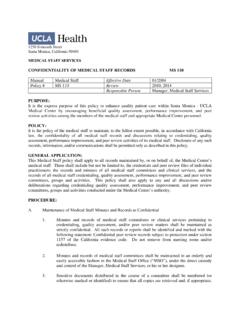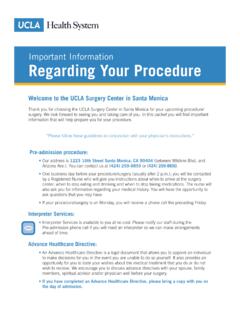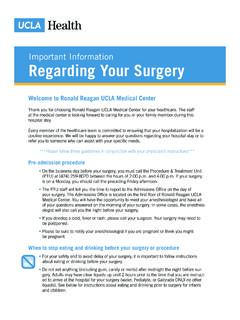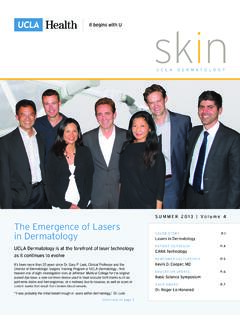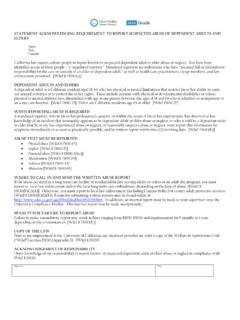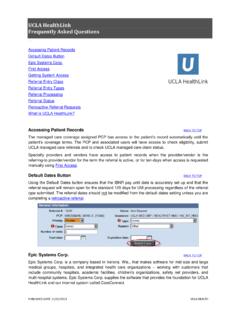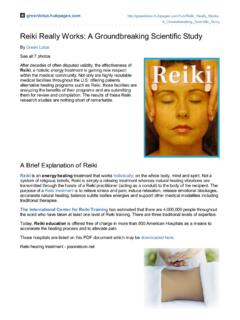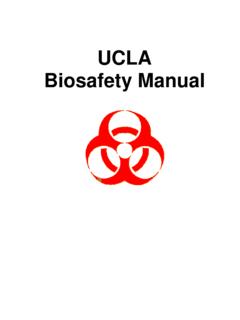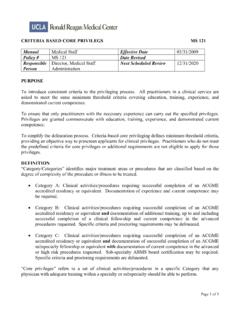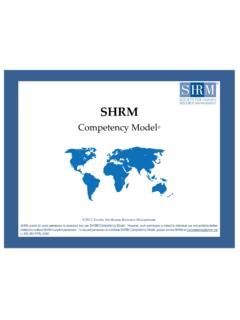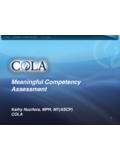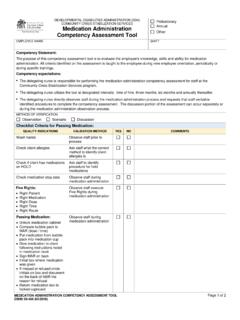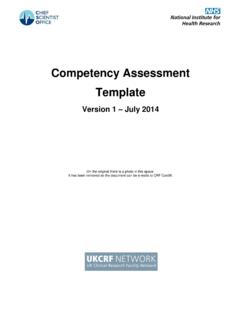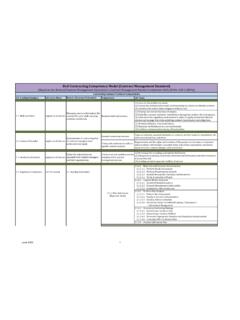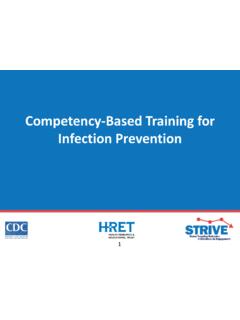Transcription of Competency Verification - UCLA Health
1 Assessing all Domains of Skill Donna Wright Clinical/Technical Cognitive Skills Knowledge Psychomotor Skills Technical understanding (ability to follow directions and carry our procedures) Critical Thinking Problem Solving Time Management Priority Setting Planning Ethics Resource Allocation Fiscal Responsibility Clinical Reasoning Reflective Practice Learning Change Management Interpersonal Skills Communication Customer Service Conflict Management Delegation Facilitation Collaboration Directing Others Articulation Understanding Diversity Building and nurturing team skills Respecting Caring Methods of Competency Verification Donna Wright Method Domain Tests/Exams Cognitive skills and Knowledge (measure attainment of cognitive information) Is retention of information what we want to measure for this Competency ? Written test, quizzes, oral exams, surveys, calculation tests, crossword puzzle tests, and word games (some forms).
2 Does not reflect the behavioral (critical thinking or interpersonal skills), performance or psychomotor skills. Return Demonstrations Technical Skill (psychomotor) Demonstrate set of skills (technique) to a skilled observer. Observer must keep the environment safe-stop skill if unsafe or negative consequences for patient, public or employee. Evidence of daily work Technical domain Assessing the actions we demonstrate on a daily basis to do our job. Must capture and document. Case Studies Critical thinking skills Create case study-questions reflect the situation and the capture the nature of the Competency you are measuring. OR Identify questions that capture the nature of the Competency and have employees use their real-life situations as the story. Then use the list of general questions to demonstrate their critical thinking skills in a real-life situation. This approach is better at revealing application to real-world situations and assess ability to observe.
3 Exemplars Critical thinking skills and Interpersonal skills Story you tell or write yourself. Describes a situation you have experienced or may experience; can describe a rationale you thought about and choices you made in a situation. Can assess actions NOT taken; especially when not taking action is the Competency choice in a given situation. Examples: establishing trust, providing customer service, dealing with sensitive issues. Peer Review Critical thinking skills and Interpersonal skills Help reinforce behaviors we want. Can be a positive, motivating experience or devastating negative experience (depends on approach and how it is done). Written or face-to-face. Keep it short and to the point-measure a single Competency item. Measures only those aspects that are seen by other people (example patient education is done with the patient alone; a co-worker may see the documentation not the education itself).
4 A peer is anyone who sees you do your job. Process must be: 1. Safe for the person giving the feedback. 2. Safe for the person receiving the feedback. 3. Safe for the person who is going to interpret the feedback. Self- assessment Some Critical thinking skills (especially those associated with values and beliefs). Best used to assess aspects of the Affective Domain of Learning Valuable in measuring competencies that relate to values, beliefs, myths, and assumptions that help/hinder us in achieving our desired outcomes. Example Pain Management Self- assessment . Reflective exercise that allows exploration of the thoughts that influence day-to-day judgements (conscious and previously unconscious thoughts). Presentations Assess competencies that deal with knowledge and understanding. Measures Competency of a presenter s knowledge and understanding of a subject. Refers to giving a presentation not merely attending one.
5 For a class or in-service to be used as a measurement of Competency assessment , the class must include one of the other Verification methods (test, group discussion, case study, etc.) Mock Events/Surveys Used to assess responses in daily work or practice (simulations of real-world situations). Used in conjunction with and education event or stand alone as merely a Verification of skill(s). Mock Events reflect individual performance. Debriefing after the event is essential. Reflective learning-recognizing mistakes and identifying future actions are an essential part of ongoing learning and development. Mock Codes Stimulated disaster drills/emergency situations Mock accreditation/inspection surveys Mock drills (fire) Hazardous material spill clean up Mock surveys of proper equipment use and maintenance Mock financial audits Quality Improvement Monitors Measure all three skill domains Critical Thinking, Technical, and Interpersonal.
6 Any time a QI monitor reflects individual performance, it is automatically a Verification of Competency . Monitor our outcomes and environment Compliance with policies and protocols Examples 1. Chart/Documentation Audits 2. Compliance with Infection Control Policies 3. Appropriate equipment set-up/teardown/cleanup Discussion/Reflection Groups Critical thinking skills (When linked to mock events, may also be used to measure technical and interpersonal skills). Valid way to look at critical thinking skills, promote group cohesiveness and mutual support. Purpose is to allow the group to share their thoughts and strategies on an issue, and discuss the merits and consequences of each aspect. Examples: 1. Debriefing after a code 2. Debriefing after a mock event/disaster 3. Discussion group using a hypothetical situation 4. Discussion group to analyze a sentinel event Individual is asked to analyze a situation.
7 The group is asked to discuss and evaluate the choices presented. Discussion groups must have a facilitator if used for Competency assessment . Competency criteria must be prepared and clearly identified prior to the discussion. Facilitator should articulate the expectations of the Competency and use discussion groups as a Verification method. Facilitator has a final evaluation role. assessment of Critical Thinking: 1. Facilitator to guide the group through the process. 2. Establish criteria or goals for the discussion activity 3. Select case study (meaningful) or real world situation recently encountered with the group. 4. Identify questions based on organizational goals and philosophies. 5. Competency assessment Verification is done by the facilitator or the group (builds a context for that behavior to continue outside the group). Specific guidelines for participants: 1. Establish expectations prior to the activity.
8 2. Each is responsible for any preparation needed prior to the discussion. 3. Participants will contribute to the group discussion (sharing ideas, discussing merits and consequences of their responses and others. Individuals who do not participate cannot use this for Competency validation. 4. Must commit to providing a respectful environment for discussion and support the group as a whole. 5. Will look for ways to support colleagues in the process. 6. Encourage the group to establish action plans for ongoing group support strategies and growth opportunities Wright, D. K. (2005). The ultimate guide to Competency assessment in Health care. Creative Health Care Management.)
